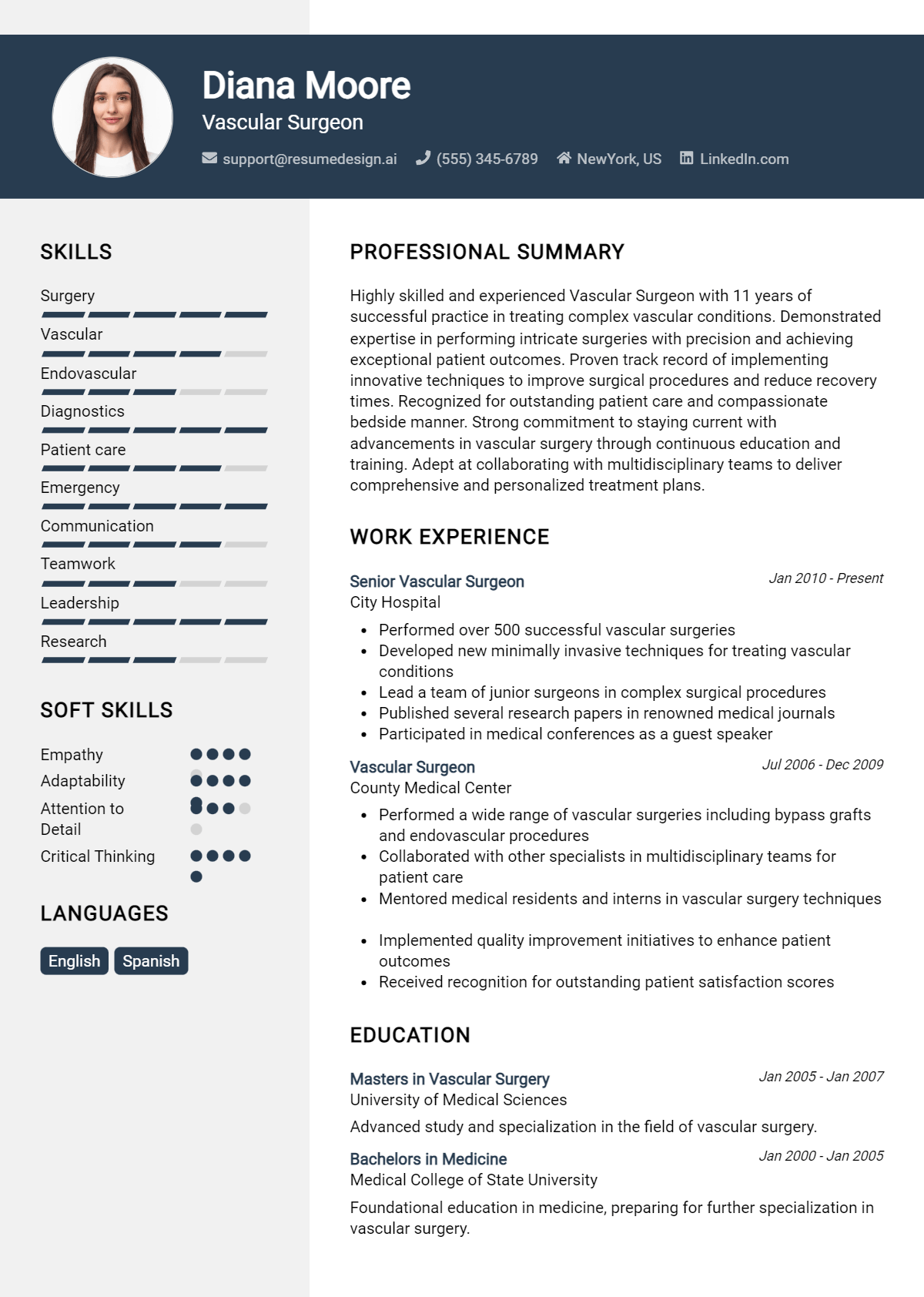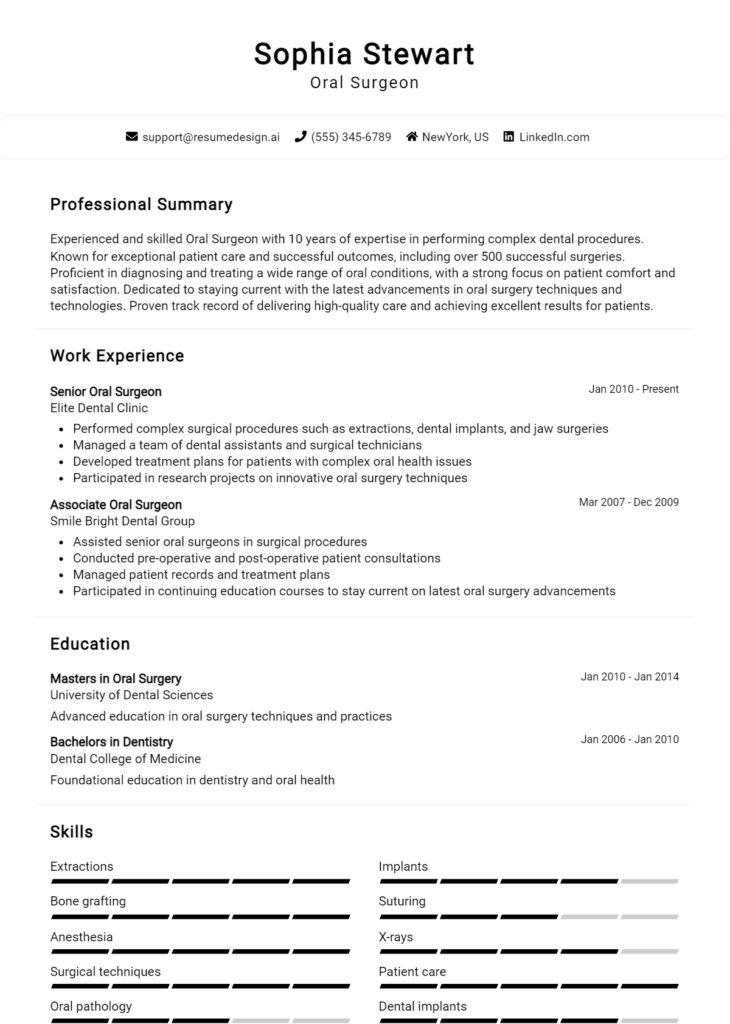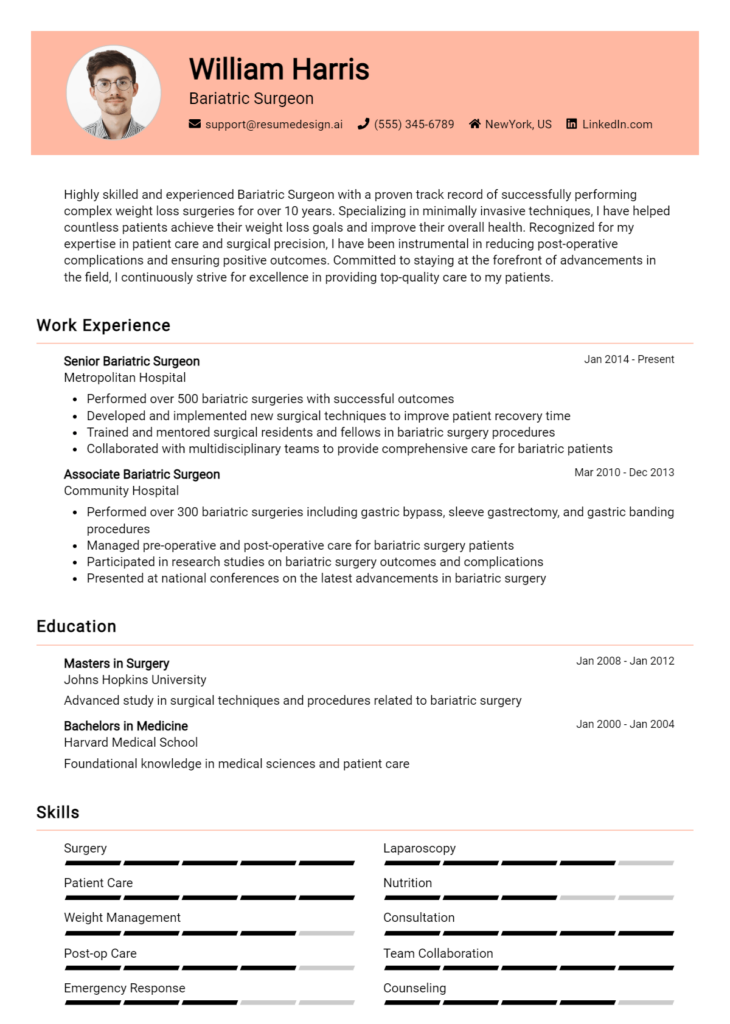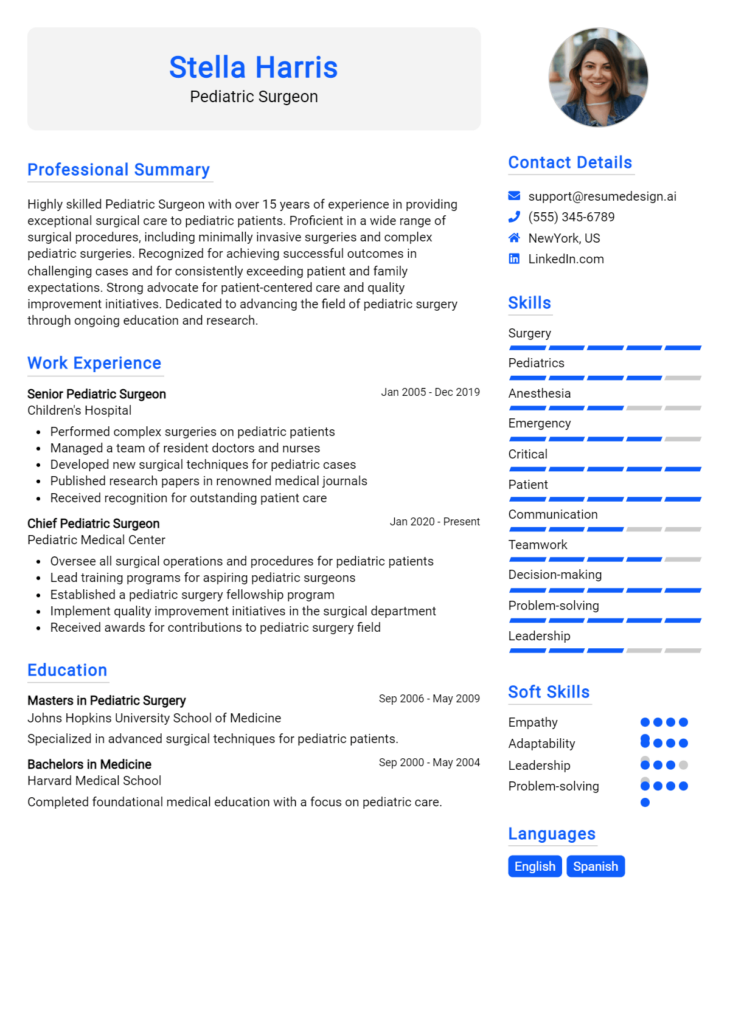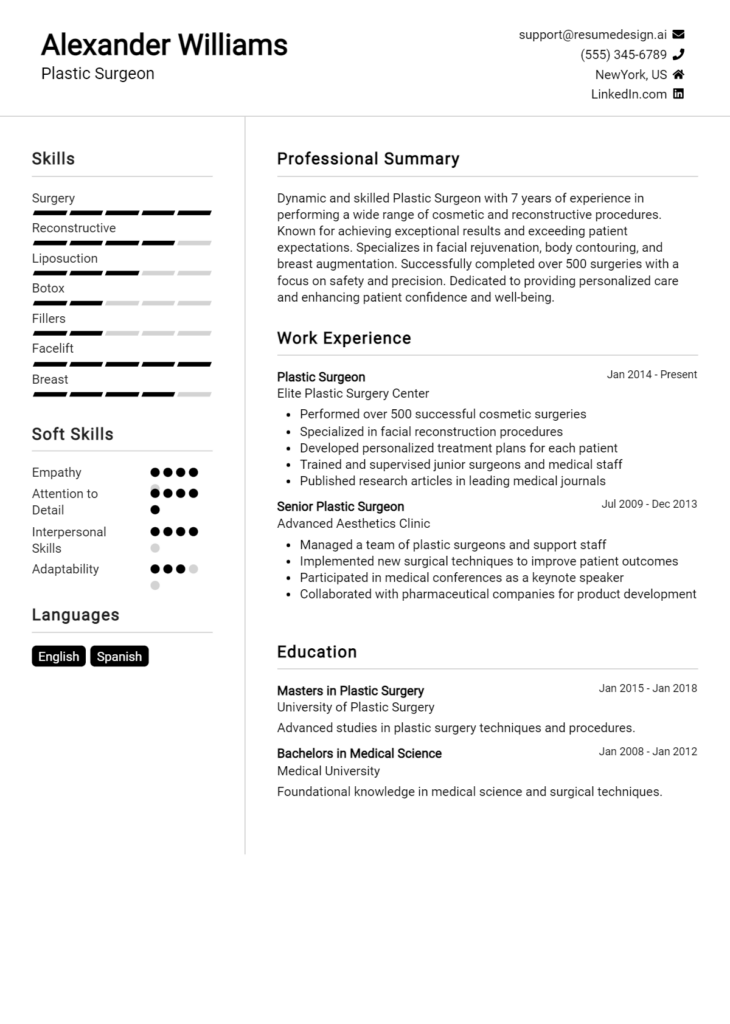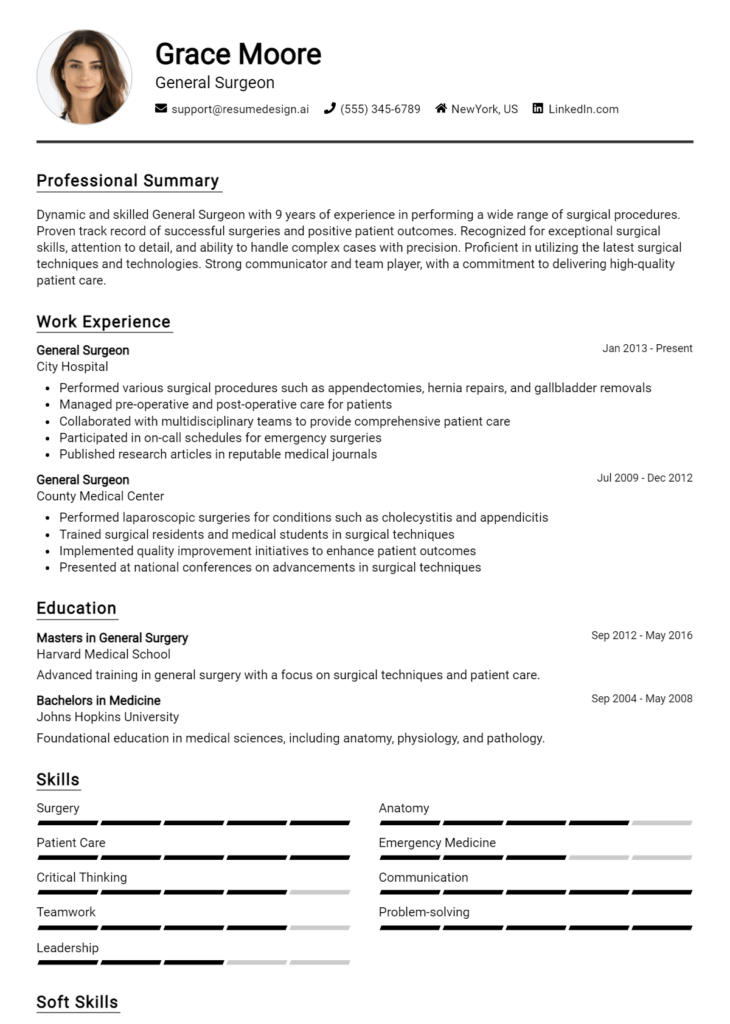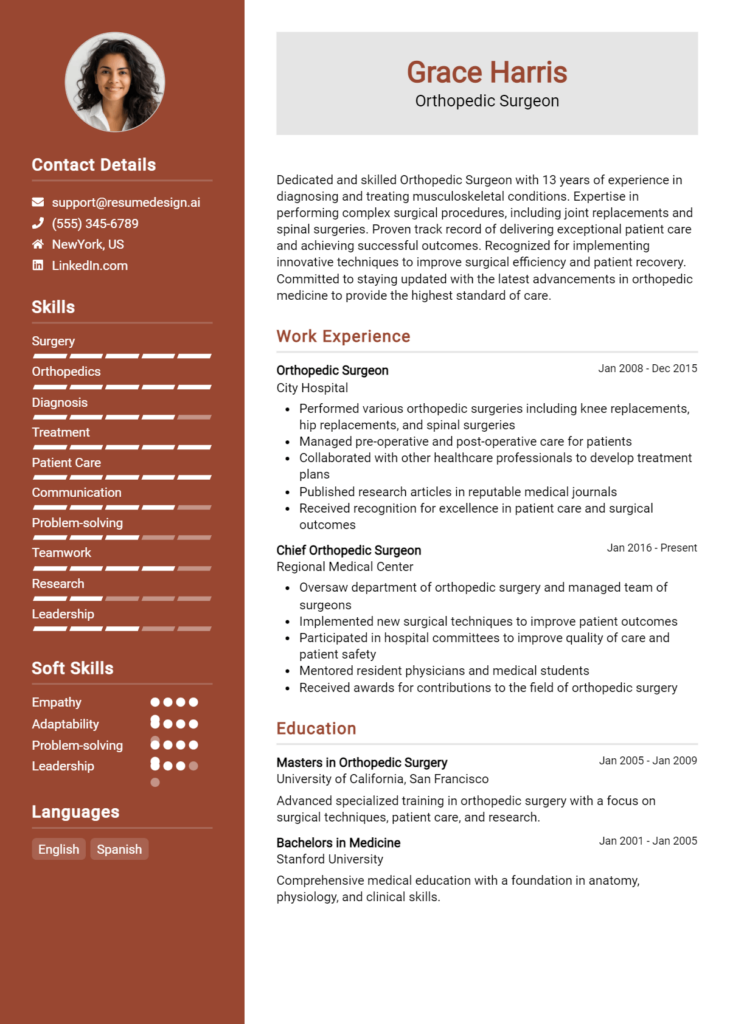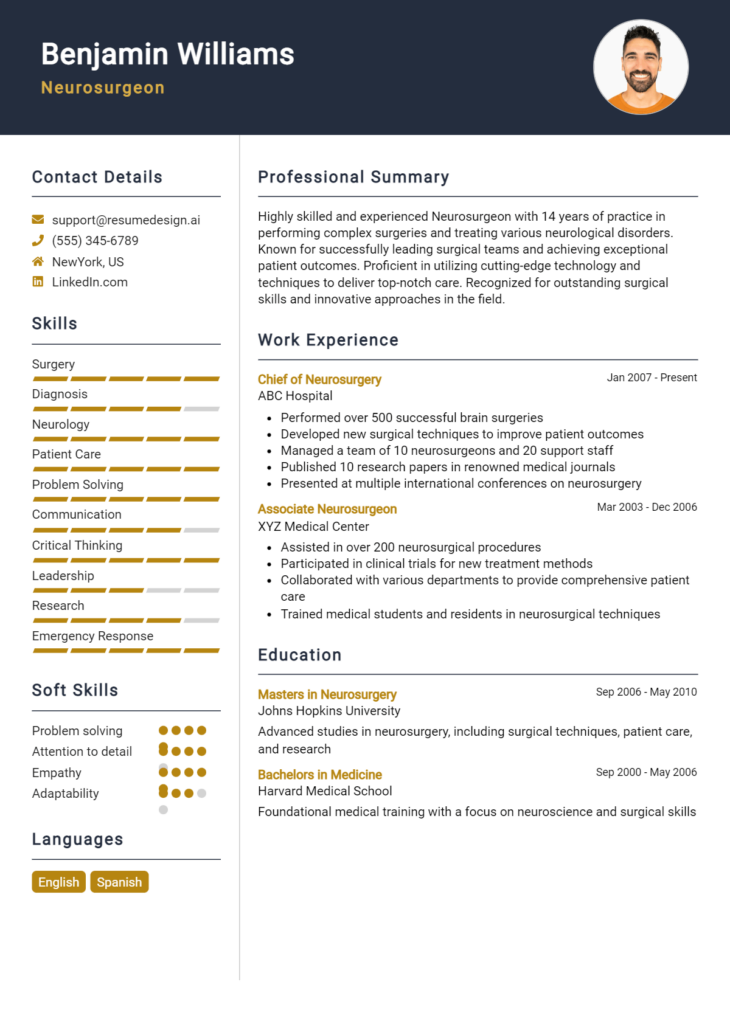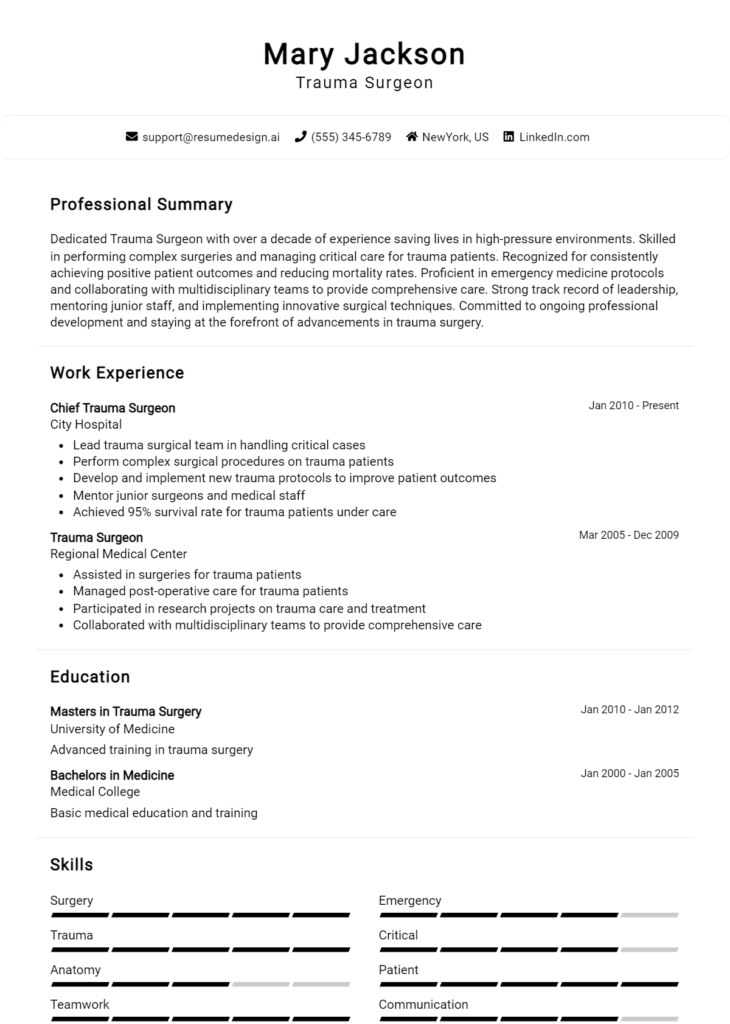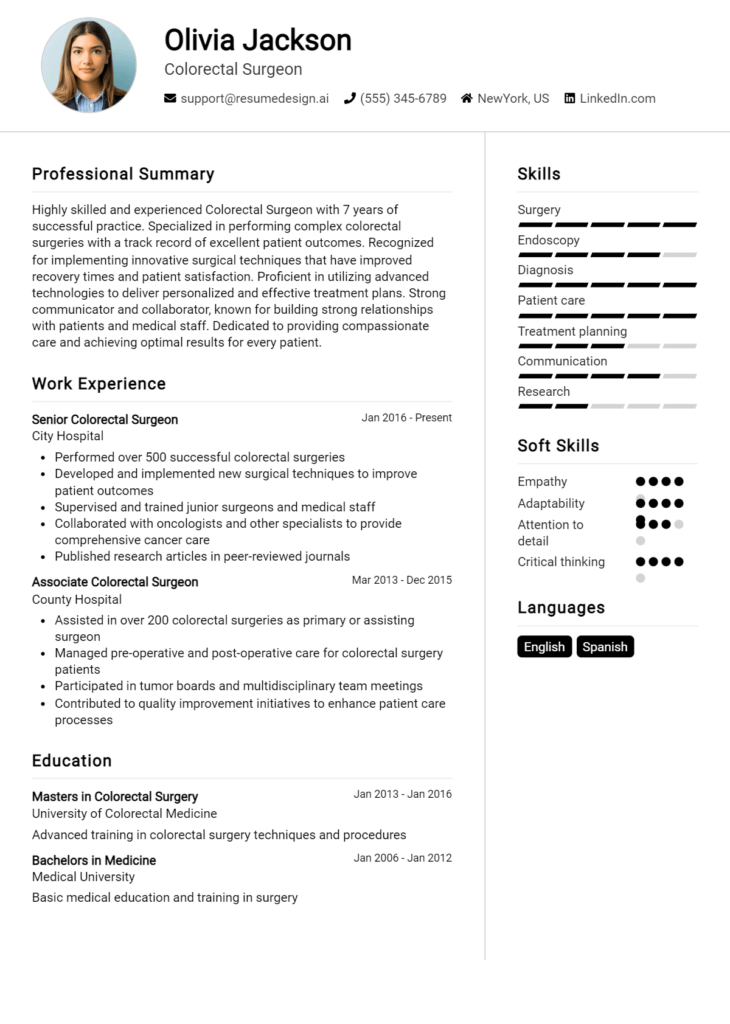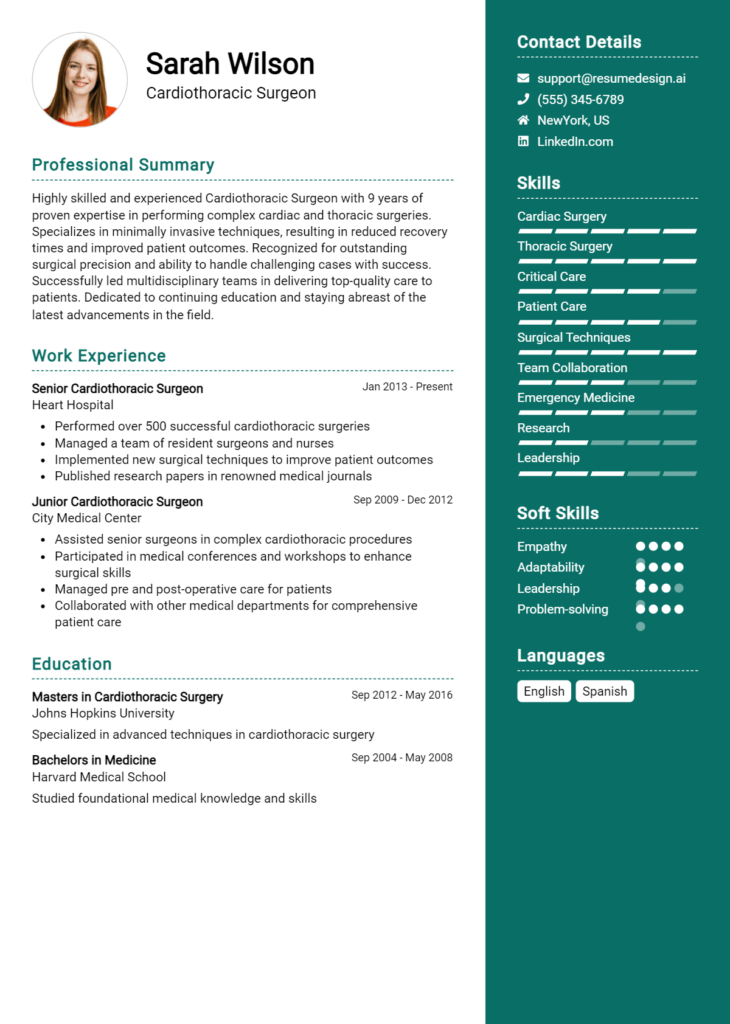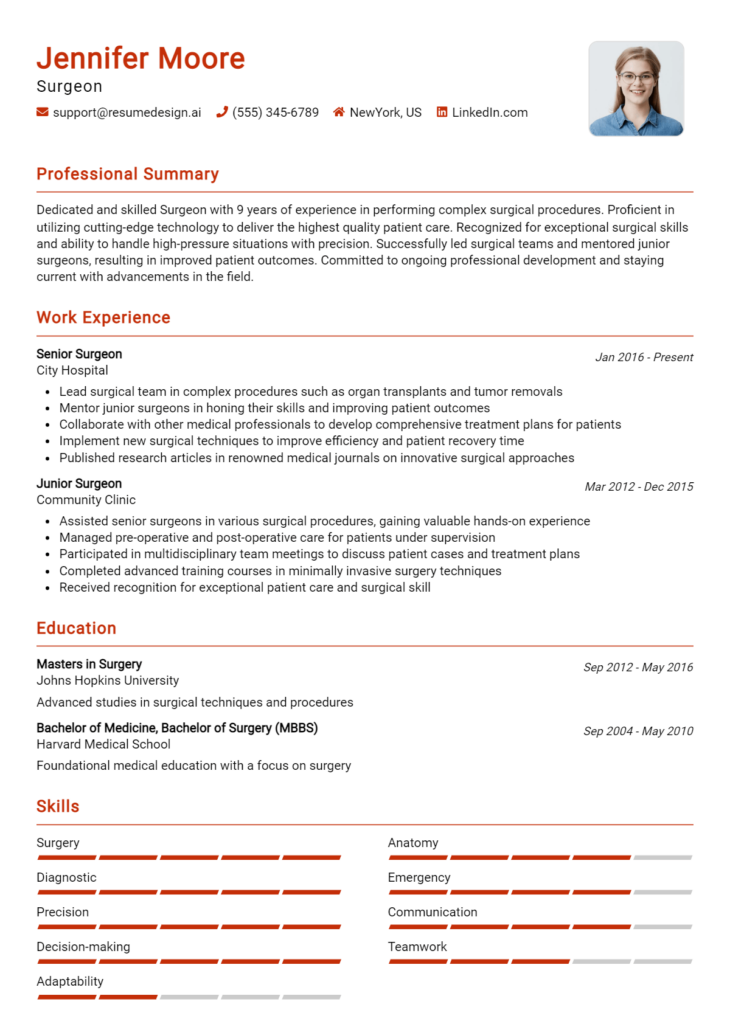Vascular Surgeon Core Responsibilities
A Vascular Surgeon plays a critical role in diagnosing and treating conditions affecting the vascular system, often bridging various departments such as cardiology, radiology, and surgical units. Key responsibilities include performing complex surgical procedures, managing patient care, and collaborating with multidisciplinary teams. Essential skills include technical expertise, operational efficiency, and robust problem-solving abilities, which are vital for achieving organizational goals. A well-structured resume that highlights these qualifications can significantly enhance career opportunities and visibility in this specialized field.
Common Responsibilities Listed on Vascular Surgeon Resume
- Performing vascular surgeries, including bypass and endovascular procedures.
- Diagnosing vascular diseases using imaging techniques and physical examinations.
- Collaborating with other medical professionals for comprehensive patient care.
- Managing pre-operative and post-operative patient care and recovery.
- Conducting patient consultations and providing treatment recommendations.
- Monitoring and evaluating patient outcomes and surgical results.
- Participating in research and clinical trials to advance vascular health.
- Educating patients on vascular health and preventive measures.
- Maintaining accurate medical records and documentation.
- Leading and training surgical teams in best practices.
High-Level Resume Tips for Vascular Surgeon Professionals
In the competitive field of vascular surgery, a well-crafted resume serves as a crucial doorway to professional opportunities. As the first impression a candidate makes on potential employers, your resume needs to effectively reflect not only your skills and qualifications but also the achievements that set you apart from other candidates. A compelling resume can significantly enhance your chances of being selected for an interview, making it essential to present your experience and expertise in the best light. This guide will provide practical and actionable resume tips specifically tailored for Vascular Surgeon professionals, ensuring that your application stands out in a crowded job market.
Top Resume Tips for Vascular Surgeon Professionals
- Tailor your resume to each job description by incorporating relevant keywords and phrases that match the requirements of the position.
- Showcase your clinical experience prominently, highlighting specific procedures and surgeries you've performed.
- Quantify your achievements by including metrics such as patient outcomes, surgical success rates, or improvements in patient care.
- Highlight your technical skills, such as proficiency in minimally invasive techniques, imaging technologies, and vascular diagnostics.
- Include relevant certifications and licenses, ensuring they are current and clearly displayed.
- Demonstrate your commitment to continuous learning by mentioning any recent training, fellowships, or conferences attended.
- Use a professional format that is easy to read, with clear headings and bullet points to break up dense text.
- Incorporate any leadership roles or committee memberships that demonstrate your capability in collaboration and decision-making within a healthcare setting.
- Consider adding a section for publications or research projects that showcase your contributions to the field of vascular surgery.
- Proofread your resume meticulously to eliminate any errors, ensuring it conveys professionalism and attention to detail.
By implementing these tips, you can significantly increase your chances of landing a job in the Vascular Surgeon field. A tailored, achievement-focused resume not only enhances your visibility to potential employers but also reinforces your qualifications and dedication to your specialty, making a strong case for why you should be the preferred candidate.
Why Resume Headlines & Titles are Important for Vascular Surgeon
In the competitive field of vascular surgery, a well-crafted resume headline or title plays a crucial role in making a strong first impression on hiring managers. A compelling headline can immediately capture attention and succinctly summarize a candidate's key qualifications in a powerful phrase. It serves as a snapshot of the applicant's expertise and professional identity, making it essential for it to be concise, relevant, and directly aligned with the job being applied for. A strong headline not only differentiates a candidate from others but also sets the tone for the rest of the resume, encouraging hiring managers to delve deeper into the applicant's background.
Best Practices for Crafting Resume Headlines for Vascular Surgeon
- Keep it concise: Aim for a headline that is no longer than one sentence.
- Be role-specific: Use industry-related terms that are relevant to vascular surgery.
- Highlight key qualifications: Focus on your most impressive skills or experiences.
- Use action-oriented language: Choose powerful verbs that convey confidence and ability.
- Incorporate numbers or metrics: Quantify your achievements when possible to add impact.
- Avoid jargon: Use clear language that is easily understood by hiring managers.
- Tailor to the job description: Align your headline with the specific requirements of the position.
- Showcase your unique selling proposition: Highlight what sets you apart from other candidates.
Example Resume Headlines for Vascular Surgeon
Strong Resume Headlines
Board-Certified Vascular Surgeon with 10+ Years of Experience in Advanced Minimally Invasive Techniques
Dedicated Vascular Surgeon Specializing in Complex Aortic Surgery and Patient-Centric Care
Accomplished Vascular Surgeon with a Proven Track Record in Reducing Postoperative Complications
Weak Resume Headlines
Surgeon Looking for Job
Experienced Medical Professional
The strong headlines are effective because they are specific, highlight relevant experience, and convey a sense of expertise and accomplishment. They capture the reader's attention and provide a clear understanding of the candidate's qualifications at a glance. In contrast, the weak headlines fail to impress due to their vagueness and lack of detail, making it difficult for hiring managers to gauge the candidate’s true capabilities or fit for the position. A well-crafted headline can significantly enhance the overall impact of a resume, setting the stage for a successful job application.
Writing an Exceptional Vascular Surgeon Resume Summary
A well-crafted resume summary is crucial for a Vascular Surgeon as it serves as the first impression to hiring managers, encapsulating the candidate's key skills, extensive experience, and notable accomplishments in a succinct manner. A strong summary not only highlights what sets the applicant apart but also aligns closely with the specific requirements of the position they are applying for. By capturing the essence of their professional journey in a few impactful sentences, candidates can effectively draw the attention of employers and increase their chances of landing an interview.
Best Practices for Writing a Vascular Surgeon Resume Summary
- Quantify Achievements: Use specific numbers and statistics to demonstrate your impact and success in previous roles.
- Focus on Relevant Skills: Highlight skills that are directly applicable to vascular surgery, such as surgical techniques and patient management.
- Tailor for the Job Description: Customize your summary to reflect the language and requirements of the job listing.
- Be Concise: Aim for a summary that is 3-5 sentences long, focusing on the most critical information.
- Use Action Verbs: Start sentences with dynamic verbs to convey confidence and proactivity.
- Highlight Certifications: Mention any relevant board certifications or special training that enhance your qualifications.
- Showcase Leadership Experience: If applicable, include roles that demonstrate your ability to lead surgical teams or manage complex cases.
- Emphasize Patient Outcomes: If possible, reference improvements in patient outcomes or satisfaction as a result of your care.
Example Vascular Surgeon Resume Summaries
Strong Resume Summaries
Board-certified Vascular Surgeon with over 10 years of experience in minimally invasive procedures, achieving a 95% patient satisfaction rate and a 30% reduction in post-operative complications through innovative surgical techniques.
Dynamic Vascular Surgeon skilled in endovascular interventions with a proven track record of performing over 300 successful procedures annually, resulting in a 20% improvement in patient recovery times.
Dedicated Vascular Surgeon with expertise in complex aortic dissections and a history of leading multidisciplinary teams to enhance patient outcomes, contributing to a departmental increase in successful surgeries by 15% over two years.
Weak Resume Summaries
Experienced surgeon with some vascular surgery knowledge, looking for a new opportunity to apply my skills.
Vascular Surgeon with a variety of surgical experience seeking to work in a hospital setting.
The examples of strong resume summaries are effective because they provide specific details about the candidate's achievements, use quantifiable metrics to highlight success, and demonstrate relevance to the role of a Vascular Surgeon. In contrast, the weak summaries lack specificity, fail to convey measurable outcomes, and come across as generic, making it difficult for hiring managers to assess the candidate's qualifications and suitability for the position.
Work Experience Section for Vascular Surgeon Resume
The work experience section of a Vascular Surgeon resume is critical in demonstrating the candidate's technical skills and professional expertise. This section serves as a platform to showcase not only surgical proficiency but also the ability to lead medical teams, manage complex cases, and contribute to high-quality patient outcomes. By quantifying achievements and aligning experiences with industry standards, candidates can effectively illustrate their impact in previous roles, making their resume stand out to potential employers.
Best Practices for Vascular Surgeon Work Experience
- Highlight specific surgical procedures performed and related success rates.
- Quantify outcomes, such as reduction in complication rates or patient recovery times.
- Emphasize leadership roles in multidisciplinary teams and collaborative projects.
- Include certifications and specialties relevant to vascular surgery.
- Use action verbs to describe responsibilities and achievements.
- Align experiences with current industry standards and practices.
- Maintain a clear and concise format for easy readability.
- Tailor the work experience section to match the job description of the position applied for.
Example Work Experiences for Vascular Surgeon
Strong Experiences
- Performed over 300 complex vascular surgeries with a 98% success rate, significantly reducing post-operative complications.
- Led a multidisciplinary team in the development and implementation of a new endovascular protocol, resulting in a 20% decrease in patient recovery time.
- Collaborated with radiologists and anesthesiologists to optimize procedural workflows, enhancing team efficiency and improving patient satisfaction scores by 15%.
- Mentored junior surgeons and residents, fostering a collaborative learning environment that improved surgical technique mastery among trainees.
Weak Experiences
- Assisted in surgeries and performed some procedures.
- Worked in a hospital setting with various patients.
- Participated in team meetings and discussed patient care.
- Contributed to vascular surgery in a general capacity.
The examples categorized as strong experiences demonstrate clear, quantifiable achievements and showcase leadership and collaboration, painting a comprehensive picture of the candidate's capabilities. In contrast, the weak experiences lack specificity and measurable outcomes, making them less impactful and failing to convey the candidate's true potential in the field of vascular surgery.
Education and Certifications Section for Vascular Surgeon Resume
The education and certifications section of a Vascular Surgeon resume is crucial in establishing the candidate's qualifications and expertise in the field. It effectively showcases their academic background, highlighting degrees from reputable institutions, and underscores their commitment to professional development through relevant certifications and continuous learning efforts. By detailing relevant coursework, industry-recognized certifications, and specialized training, this section significantly enhances the candidate's credibility and demonstrates their alignment with the specific job role requirements, making them a compelling candidate for potential employers.
Best Practices for Vascular Surgeon Education and Certifications
- Include relevant degrees such as Doctor of Medicine (MD) or Doctor of Osteopathy (DO) from accredited medical schools.
- List board certifications, such as the American Board of Surgery (ABS) certification in Vascular Surgery.
- Highlight any fellowships completed in vascular surgery or related subspecialties.
- Detail relevant coursework or training in vascular anatomy, surgical techniques, and patient management.
- Incorporate any continuing education credits or advanced certifications from recognized institutions.
- Maintain clarity and precision, ensuring all information is up-to-date and relevant to the position.
- Use bullet points for easy readability and to draw attention to key achievements and qualifications.
- Consider including any memberships in professional organizations related to vascular surgery.
Example Education and Certifications for Vascular Surgeon
Strong Examples
- Doctor of Medicine (MD), Harvard Medical School, Graduated: 2015
- Board Certified in Vascular Surgery, American Board of Surgery, Certified: 2020
- Fellowship in Vascular Surgery, Mayo Clinic, Completed: 2018
- Advanced Endovascular Techniques, Society for Vascular Surgery Certification, Completed: 2022
Weak Examples
- Bachelor of Arts in English Literature, University of California, Graduated: 2010
- Certification in Basic Life Support (BLS), Expired: 2019
- Online Course: Introduction to Vascular Biology, Completed: 2016
- Certification in Medical Billing and Coding, Completed: 2017
The examples listed under "Strong Examples" are considered strong because they directly relate to the qualifications and training required for a Vascular Surgeon, demonstrating a solid foundation in medicine and specialized expertise in vascular surgery. Conversely, the "Weak Examples" fail to establish relevance to the field of vascular surgery, featuring outdated or unrelated qualifications that do not enhance the candidate's profile for the specific role they are pursuing.
Top Skills & Keywords for Vascular Surgeon Resume
A well-crafted resume for a vascular surgeon is crucial in showcasing not only medical expertise but also the essential skills that set candidates apart in a highly specialized field. The ability to perform intricate surgical procedures, combined with strong interpersonal and problem-solving skills, can significantly impact a surgeon's effectiveness and patient outcomes. Highlighting both hard and soft skills in your resume allows potential employers to see your comprehensive capabilities, ensuring you stand out among other qualified applicants. For those looking to refine their resume, understanding the key skills relevant to a vascular surgeon role is paramount.
Top Hard & Soft Skills for Vascular Surgeon
Soft Skills
- Excellent communication skills
- Strong decision-making abilities
- Empathy and compassion
- Attention to detail
- Team collaboration
- Leadership capabilities
- Stress management
- Critical thinking
- Adaptability
- Time management
Hard Skills
- Proficiency in vascular surgical techniques
- Knowledge of imaging technologies (e.g., ultrasound, CT scans)
- Expertise in patient evaluation and diagnosis
- Familiarity with postoperative care
- Ability to perform minimally invasive procedures
- Understanding of vascular anatomy
- Competency in using surgical instruments
- Knowledge of anesthesiology basics
- Proficiency in electronic health records (EHR)
- Experience in conducting clinical research
By emphasizing these skills in your resume, along with a detailed account of your work experience, you can create a powerful representation of your qualifications as a vascular surgeon.
Stand Out with a Winning Vascular Surgeon Cover Letter
Dear [Hiring Manager's Name],
I am writing to express my interest in the Vascular Surgeon position at [Hospital/Clinic Name], as advertised [where you found the job listing]. With over [X years] of specialized experience in vascular surgery and a commitment to providing top-tier patient care, I am excited about the opportunity to contribute my skills and expertise to your esteemed team. My extensive training and hands-on experience in both open and endovascular procedures equip me to address a wide range of vascular conditions, ensuring optimal outcomes for my patients.
Throughout my career, I have demonstrated a strong commitment to advancing surgical techniques and improving patient safety. At [Previous Institution Name], I successfully led a multidisciplinary team in developing a protocol for minimally invasive vascular surgeries, which resulted in a [X%] reduction in recovery time and a [X%] decrease in postoperative complications. I am passionate about staying at the forefront of surgical innovation and am continually pursuing opportunities for professional development and education. My dedication to research, coupled with my clinical skills, has resulted in several published articles in peer-reviewed journals, further underscoring my commitment to the field.
In addition to my technical skills, I pride myself on my ability to build strong relationships with patients and their families. I believe that effective communication is essential in fostering trust and understanding, which ultimately leads to better patient outcomes. I take the time to educate my patients about their conditions and treatment options, ensuring they feel informed and empowered throughout their care journey. I am eager to bring this patient-centered approach to [Hospital/Clinic Name] and collaborate with your talented team to enhance the quality of care provided to our community.
I am excited about the possibility of joining [Hospital/Clinic Name] and contributing to your mission of delivering exceptional vascular care. Thank you for considering my application. I look forward to the opportunity to discuss how my background, skills, and passion for vascular surgery align with the goals of your organization.
Sincerely,
[Your Name]
[Your Contact Information]
Common Mistakes to Avoid in a Vascular Surgeon Resume
In the competitive field of vascular surgery, crafting a compelling resume is essential for standing out among peers. However, many candidates make common mistakes that can detract from their qualifications and experiences. To ensure that your resume effectively showcases your skills and expertise, it's important to avoid these pitfalls that can undermine your candidacy.
Lack of Tailoring: Failing to tailor your resume to the specific job description can make it appear generic. Highlight relevant skills and experiences that align with the position you are applying for.
Overloading with Technical Jargon: While it's crucial to demonstrate your medical expertise, using excessive medical terminology can confuse non-medical recruiters. Balance technical language with clear explanations to ensure understanding.
Neglecting Soft Skills: Focusing solely on technical skills can overlook the importance of soft skills like communication, teamwork, and leadership, which are critical in a surgical setting. Make sure to include these attributes.
Inadequate Formatting: A cluttered or unprofessional layout can detract from the content of your resume. Use clear headings, bullet points, and consistent formatting to enhance readability.
Omitting Relevant Experience: Some candidates may overlook including significant experiences such as residencies, fellowships, or volunteer work. Ensure all relevant experiences are listed to present a complete picture of your qualifications.
Using Passive Language: Employing passive voice can make your accomplishments seem less impactful. Use active language to convey your achievements confidently.
Ignoring Continuing Education: In a rapidly evolving field like vascular surgery, ongoing education is vital. Failing to mention recent certifications, courses, or conferences can signal a lack of commitment to professional development.
Not Quantifying Achievements: Generic statements about responsibilities can be less compelling than specific achievements. Whenever possible, quantify your accomplishments (e.g., number of surgeries performed, patient outcomes) to demonstrate your impact in previous roles.
Conclusion
As a Vascular Surgeon, your role is crucial in diagnosing and treating conditions affecting the vascular system, including arteries, veins, and lymphatic circulation. The article emphasized the importance of specialized skills, such as performing surgical procedures, understanding complex vascular diseases, and collaborating with a multidisciplinary team to ensure optimal patient care.
Additionally, it highlighted the significance of continuous education and staying updated with the latest advancements in vascular surgery techniques and technologies. Networking with peers and engaging in professional societies can also contribute to career growth and patient outcomes.
In conclusion, as you strive to excel in your career as a Vascular Surgeon, it's essential to present your qualifications effectively. Take the time to review and update your Vascular Surgeon resume to reflect your skills, experiences, and achievements accurately. Utilize available resources such as resume templates, a convenient resume builder, insightful resume examples, and polished cover letter templates. These tools can help you create a compelling resume that stands out to potential employers. Start enhancing your career today!

